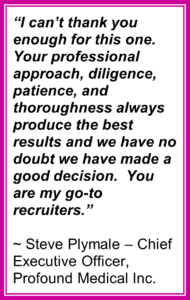(Reading Time: 3 minutes)
Understanding the gold standard of interviewing
A couple months ago, I told you about Paul and Cindy, who run a small business making and selling heirloom baby quilts. They decided they needed some help, and hired us, a non-contingency retained recruiter. We worked with them on determining what positions they needed to hire for, setting expectations on compensation, and identifying the right candidate.
In that post I talked about the ideal process for hiring a candidate and walked you through the process that we at Kathbern like to follow. In today’s post, I’d like to go a little further into one aspect of that ideal process: the client interview. In fact, I’d like to focus on the gold standard of client interviewing: the panel interview.
Why a panel interview?
This is one of my favourite ways for a client to conduct their interviews.
Panel interviews are more efficient. They give individual interviewers time to reflect and respond to what a candidate is saying, and most importantly, ensure that all the interviewers have the same experiences with each individual candidate.
The efficiency of a panel
Let’s consider efficiency first.
In an ideal world, your recruiter would have reviewed a large number of potential candidates, then would have narrowed the field to a shortlist of three or four candidates.
There may be three or four people at your company that need to meet each candidate. You could do a series of round robins, so that each candidate meets each interviewer in a series of one-on-one meetings. Then the interviewers would gather and compare notes.
That’s a total of 9 to 16 meetings—quite a major time commitment and logistical/scheduling challenge.
 Instead, you could take one full day or two half days, and have each candidate meet with a panel consisting of all the people that need to meet each candidate. That’s four meetings, which could be done in a tight timeframe.
Instead, you could take one full day or two half days, and have each candidate meet with a panel consisting of all the people that need to meet each candidate. That’s four meetings, which could be done in a tight timeframe.
Time for reflection and response
In an individual interview, it can be easy for an interviewer to get distracted, dominate the conversion, or miss a key follow-up question. In a panel interview, each interviewer has time—while somebody else is asking a question—to think about their next question.
That could be a follow-up question to what the candidate has said in response to another interviewer’s question, or a question about a new topic altogether.
Everyone meets the same candidate
A key advantage of a panel interview is that each interviewer sees the same candidate answer the same questions at the same time. Everyone is looking at the same picture.
If done individually, different interviewers could ask different questions. Or the candidate could be in a different place in their head for each interview. Or the candidate could be sick one day or dealing with something difficult at home on another. So, with separate interviews, each interviewer is seeing a different version of the same candidate.
Ideally, if a gap of 30 minutes is planned between meetings, interviewers will be able to review pros and cons and talk about what each interviewer saw. It means you’re all talking about the same event, not a separate event. That’s why I think the panel interview is a great thing.
 The biggest value: an opportunity to agree on the job itself
The biggest value: an opportunity to agree on the job itself
But for me, the biggest value of a panel interview is that it allows the decision-makers to agree on the job itself. It’s amazing how often a job description can change—and dramatically—during the recruitment process. In many cases, key decision-makers each have a different idea of what the job should be at the outset.
That’s usually because interviewers haven’t necessarily thought all that much about the role until they start to interview people. Then they’ll realize that they don’t really need a controller, they need a general manager. Or they need to place a lot more emphasis on one particular skill set or personality type.
A panel interview gives the team the opportunity to align their perspectives and resolve any differences around the role in a timely fashion.
Hopefully, I’ve convinced you that the panel interview is the best approach. Let’s talk now about the logistics behind a successful panel interview.
Setting up the ideal panel interview
A good time frame is one hour for each interview. If you decide to do all four on the same day, you’d want to schedule start times about 1 hour and 45 minutes apart.
That gives you enough time for an hour interview with a 15-minute grace period if things get exciting. Then you’ve got time to take a bio break, grab a coffee, and then review the candidate you’ve just met before the next interview starts.
The panel interview can be on Zoom or in person. We’re finding that most initial interviews are on Zoom, and then if there’s a second interview, that’s still done in person.
If you can’t do all the interviews in one day, you should still make sure they are reasonably close together in time. You want to do them within a few days, not one interview one week, then next one the following week, and so forth.
If you space them so far apart, you won’t be able to remember what the first candidate was like after you meet the third one. When you keep the interviews close together, you make it easier on yourselves to remember the candidates, compare them, and make some decisions. You will also run less of a risk of losing a good candidate to a competing offer due to a delay in your hiring process.
Consider asking your recruiter to join the panel
It can be helpful to have your recruiter in the room for the panel interview.
We can lead off the questions until the interviewers get comfortable, then fade into the background. We can also jump in if there’s something that we know about the candidate that’s gotten lost in the process, or if the focus isn’t being kept on the candidate.
It also makes it easier for us to do our jobs. Sometimes we learn a lot more about the company, maybe even things that we weren’t aware of before.
And we can add an additional perspective in the discussion afterward on each candidate.
Don’t forget: keep the candidate talking

It can be tempting, as an interviewer, to do a lot of the talking. You might want to share old war stories or discover people that you have in common in the industry. However, that’s not the point of the interview, and it may even create the false impression that the candidate is not very talkative when the reality is that they were never able to get a word in.
You want to ask open-ended questions that keep the candidate talking and give everyone the opportunity to gauge how well the candidate answered them. Avoid questions that can be answered yes or no or with a fact.
Spread the questions around the panel, so each interviewer asks a different question. It might be helpful to prepare a few key questions in advance that you can ask every candidate. This will help get each interview started, and then the conversation can naturally follow from there.
Questions to consider
Not sure what to ask?
Here are a few to get you started:
~Tell us why you have applied for this position and why you think you would be a good fit.
~Give an example of a situation where you have demonstrated superb leadership.
~What aspect of your work are you most proud?
~Give an example of a situation where you took a significant risk.
~How do you build respect with your team?
~Describe a situation where you had to make a significant change, in spite of opposition. Tell us how you handled the opposition.
Larry Smith is the founder and president of Kathbern Management, an executive search firm based in Toronto. Kathbern helps companies find the executives and senior managers who not only have the experience and credentials to fulfill their responsibilities, but also have the emotional and “fit” requirements that will enable them to be successful in a particular environment. Kathbern simplifies the process and, through deep research, brings more and better candidates forward than would ever be possible through a do-it-yourself passive advertising campaign.
Learn more at www.kathbern.com, or contact us today for a free consultation about your key person search. Follow us on LinkedIn, Facebook, and Twitter.

